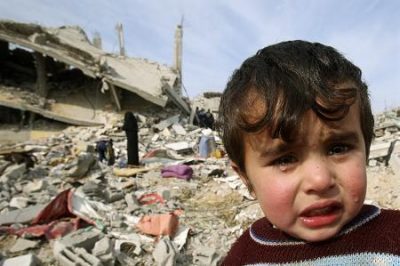The Safety of Others. “They call us antisemitic because we demand that Palestinians be entitled to the same rights we possess”
A book review

All Global Research articles can be read in 51 languages by activating the “Translate Website” drop down menu on the top banner of our home page (Desktop version).
To receive Global Research’s Daily Newsletter (selected articles), click here.
Visit and follow us on Instagram, Twitter and Facebook. Feel free to repost and share widely Global Research articles.
***
Last month, neo-Nazis stood in formation along the route of Boston’s St Patrick’s Day Parade. The overt display of white supremacy was yet another horrifying reminder of the rise of fascism in 1930s Germany and of the growing antisemitism in the United States today. It demands that we remain steadfast in dismantling antisemitism and fighting racism in all its forms. We find it both painful and ironic that major Jewish organisations are labelling us, daughters of Holocaust survivors and refugees, as antisemites.
They call us antisemitic because we are outspoken in our demand that Palestinians be entitled to the same rights we possess, which Israel has long denied them. Organisations such as Human Rights Watch, Al Haq, B’Tselem, Harvard Law School’s International Human Rights Clinic and Amnesty International have rigorously documented and analysed Israeli practices according to the frameworks of international law, and concluded that Israel is commiting crimes of apartheid against the Palestinian people. Michael Lynk, the UN special rapporteur on the situation of human rights in the Palestinian territories since 1967, has affirmed this in his latest report to the UN Human Rights Council.
But rather than condemning violations of international law and human rights, the leaders of the Anti-Defamation League (ADL), AIPAC and the Jewish Federations of North America claim that reports about Israeli apartheid will fuel antisemitism. Zionist organisations argue that Jews need a safe haven; as such, Israel must be a Jewish state – a state that enshrines in law the rights of one group of people at the expense of another. As Benjamin Netanyahu said when he was prime minister, ‘Israel is not a state of all its citizens … Israel is the nation-state of the Jewish people and only it.’
This overt supremacy is a form of racism that is incompatible with democracy, and to justify it in the name of Judaism is itself antisemitic. It is both an ethical violation of Jewish humanism – any humanism – and a practical danger to Jews everywhere. It is precisely because we are Jews and the children of victims of Nazism that we feel it is our responsibility to challenge the harm being done to Palestinians in our names and in the names of our parents.
If Zionists and their supporters always respond by ignoring the contents of reports and attacking the messenger, it is surely because the contents are indisputable. Having done decades of research in Israel and Palestine, we know all too well that the conditions on the ground documented by Amnesty and others are painfully accurate: segregation, military rule, restrictions on Palestinians’ right to political participation, dispossession of Palestinian land and property, demolition of homes, uprooting of orchards, restrictions on movement, and the denial of economic and social rights, among other abuses. Amnesty’s report last February confirms that this system of Israeli domination exists in Israel, the West Bank, East Jerusalem and Gaza. Palestinians, of course, have been saying this for decades.
Russia’s devastation of Ukraine has been rightly condemned for its violations of international law. But if international law must apply in Ukraine, why not Palestine? If it is moral and legal to protest against Russian assault, why is it considered antisemitic to protest against Israeli assault? If Ukrainians who resist and defend themselves are called heroes, why are Palestinians who resist and defend themselves against occupation and land seizures called terrorists? The point, as Peter Beinart and others have argued, is not to diminish solidarity with Ukrainians, but to extend that solidarity to Palestinians, whose oppression the West subsidises.
What is the way forward? As stated in the 2021 Jerusalem Declaration on Antisemitism, we reject the notion of Jewish exceptionalism which argues that antisemitism is a unique and incomparable form of hatred. Rather, the fight against antisemitism is ‘inseparable from the overall fight against all forms of racial, ethnic, cultural, religious and gender discrimination’. As such, we must name racism wherever it appears, including inside Israel. The danger to Jews lies not in documenting Israeli transgressions, as the ADL and others would have us believe, but in supporting them. As Brian Klug has put it,
the situation now of Jews in much of the world is dominated … not by policies and actions that are directed against Jewish interests but in the name of those interests; and not by a hostile power (Germany) that occupies the lands where Jews live but by a friendly power (Israel) that occupies territory where others live.
It is incumbent on us to resist any initiative that drives a wedge between Jews and other oppressed groups. We must oppose all attempts to justify Israel’s abusive and discriminatory treatment of Palestinians. We must assert unapologetically that opposing Israeli apartheid is not antisemitic; it is antiracist. It is part of a larger struggle that values inclusion over exclusion, and rejects oppression in all its forms, both domestically and globally. In this way the struggle against antisemitism and other forms of racism is expressed not as the politics of identity but as the politics of identification. Such an expanded embrace of the other is not only essential to combatting antisemitism, it is also essential to the survival of Judaism as a system of ethics and morality. Our safety comes from securing the safety of others, and fighting injustice wherever it occurs.
*
Note to readers: Please click the share buttons above or below. Follow us on Instagram, Twitter and Facebook. Feel free to repost and share widely Global Research articles.

